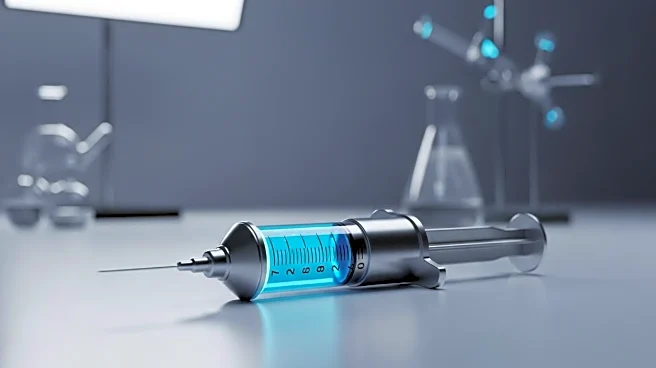What's Happening?
Researchers at Science Tokyo have developed a novel mRNA vaccine aimed at treating age-related macular degeneration (AMD), a leading cause of vision loss among the elderly. This vaccine, which can be administered intramuscularly, offers a less invasive alternative to current treatments that require direct eye injections. The vaccine was tested in mouse models and demonstrated strong suppression of abnormal blood vessel growth in the retina, a condition known as neovascularization. This development provides hope for millions of patients suffering from AMD, as the vaccine's effectiveness is comparable to existing therapies but with the added benefit of easier administration.
Why It's Important?
The development of this mRNA vaccine is significant as it could transform the treatment landscape for AMD, potentially replacing frequent and uncomfortable eye injections with a simple arm injection. This advancement could reduce the treatment burden for patients, offering long-term benefits with fewer doses. The vaccine's ability to suppress pathological neovascularization without harmful side effects marks a promising step forward in chronic eye condition management. If successful in human trials, this could lead to improved quality of life for those affected by AMD, a condition impacting nearly 200 million people worldwide.
What's Next?
Further research and clinical trials are necessary to determine the vaccine's efficacy and safety in humans. If proven effective, this mRNA vaccine could become a standard treatment for AMD, significantly altering current medical practices. The research team, led by Professor Satoshi Uchida, aims to expand the use of mRNA technology beyond infectious diseases and cancer, potentially revolutionizing treatment for chronic conditions. The findings, published in the journal Vaccine, suggest a promising future for mRNA applications in ophthalmology.
Beyond the Headlines
The success of this mRNA vaccine highlights the potential of mRNA technology beyond its initial use in COVID-19 vaccines. This innovation could pave the way for new treatments in various medical fields, emphasizing the versatility and adaptability of mRNA platforms. The ethical implications of reducing patient discomfort and improving treatment accessibility are profound, potentially setting new standards in patient care and medical technology.









